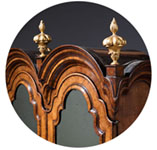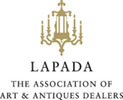18th Century George III Mahogany Serpentine Chest or Commode
Attributed to Henry Hill, Marlbrough
SOLD
Request Information
Follow Us
18th Century George III Mahogany Serpentine Chest or Commode
A fine George III mahogany serpentine commode, England, circa 1770. Attributed to Henry Hill, Marlbrough.
The three graduated drawers retain their original gilt brass handles over a unique carved apron and flanked by molded angles continuing into the shaped cabriole feet. The chest is in superb and original country house condition.
Attribution
Henry Hill was active in Marlborough Wiltshire from circa 1740 until his death in 1778 where he ran a diverse business encompassing furniture making, coach making, house agency and auctioneering. He was described in his obituary in 1778 as ‘one of the most eminent cabinet-makers and upholsterers in the Kingdom’ which was considered a great tribute to a cabinet maker working outside London. His clients were predominately Wiltshire landowners including the 9th Duke of Somerset at Maiden Bradley, Paul Methuen at Corsham Court, Henry Hoare at Stourhead, and Earl Bathurst at Cirencester Park. Hill was clearly aware of the prevailing London fashions and would have had access to publications including Chippendale’s designs for French Commode Tables (The Gentleman and Cabinet-Maker’s Director 1st Edition1754; Plate LXVI 3rd Edition 1763). He was also known to have employed immigrant labour (most likely German). All this is reflected in the designs of his furniture. His French Commodes were made with a number of variations dependent on his clients’ needs and budgets but invariably with three drawers and of serpentine form with flame figured veneers or marquetry, ormolu-mounted corners and a lobed front apron. The most documented commissions were for Lord Delaval (see bombe marquetry commode sold Bonhams London 19 October 2011). It seems likely that Hill had contact with Pierre Langlois with some of the mounts on his commodes being attributed to Langlois.
Condition
Fabulous and original country house condition with richly patinated surfaces!
Provenance
The provenance of this chest is also very interesting as it belonged to the late Major General Mark Bond, who was the last member of the Bond family to live at Moigne Combe. General Bond had an illustrious military career; he enlisted as a rifleman in 1940 following the Blitz of London. Major-General Bond served at the Battle of El-Alamein and the capture of Tunis. In 1943 Mark Bond was taken as a POW but managed to pull off a daring escape from his transport train. He was only recaptured after trying to steal supplies from the Germans. Major-General Mark Bond also served as aide de camp to Field Marshal Montgomery, NATO Deputy Supreme Allied Commander in Europe 1950. A letter from Field Marshal Montgomery thanking Mark Bond for his service is present at Moigne Combe. During his fascinating life he had a distinguished military career, held prestigious Dorset offices and maintained an active approach to conservation (planting over 60,000 trees on his estate).
Literature
Dimensions
PREVIOUSLY SOLD
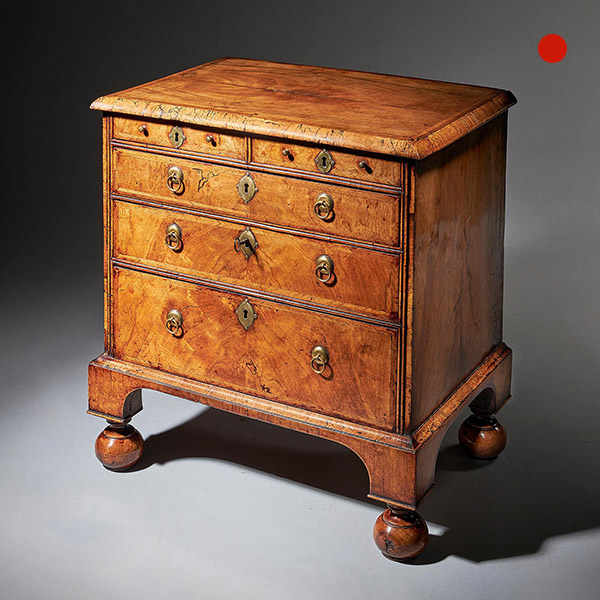
An extremely rare George I walnut chest of small proportions on ball and bracket
An extremely rare George I walnut chest of small proportions on ball and bracket SOLD Follow UsAn extremely rare George I walnut chest of small proportions on ball and bracket The cross-grain moulded and feather banded book-matched top sits...
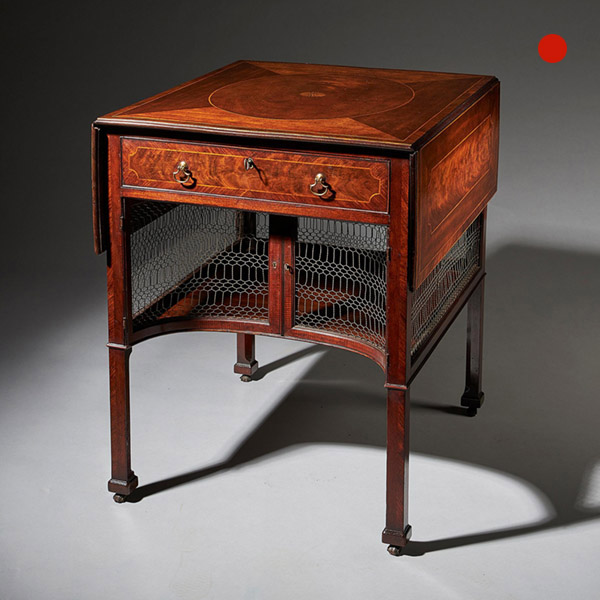
An extremely fine and rare early George III mahogany supper table plausibly by Thomas Chippendale
An extremely fine and rare early George III mahogany supper table plausibly by Thomas Chippendale Sold Follow UsAn extremely fine and rare early George III mahogany supper table plausibly by Thomas Chippendale An extremely fine and rare early...
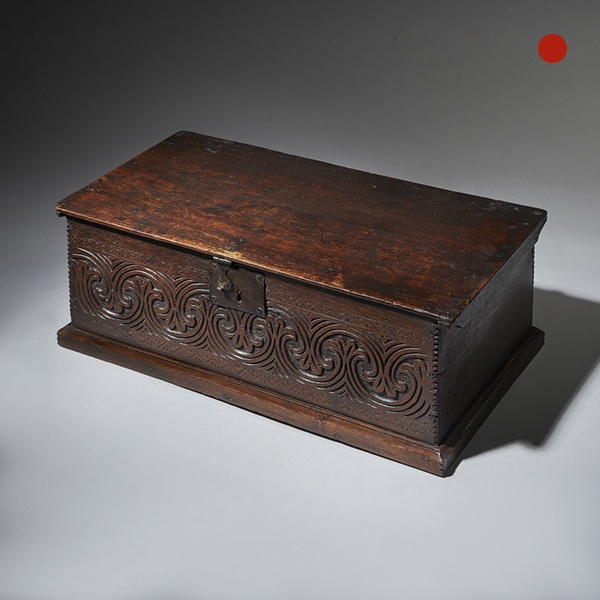
Late 17th Century Charles II Carved Oak Bible Box, Deed Box, Blanket Box,or Candle Box
Late 17th Century Charles II Carved Oak Bible Bo, Deed, Blanket, or Candle Box Sold Follow UsLate 17th Century Charles II Carved Oak Bible, Deed, Blanket, or Candle Box A superb and original late 17th century oak box with excellent and deep...
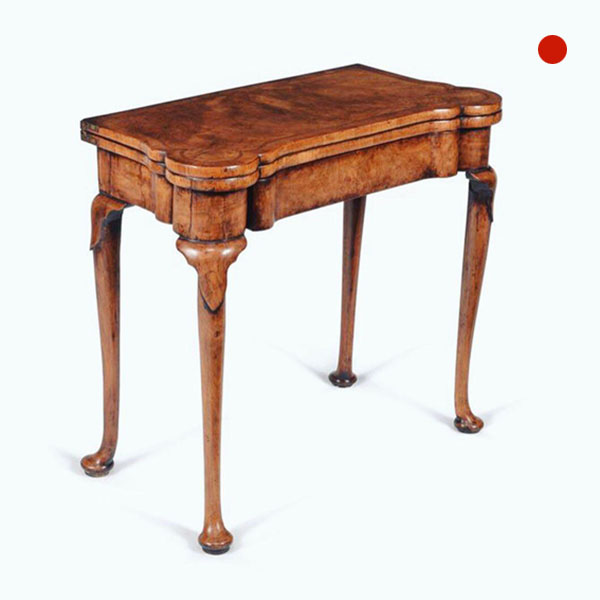
Fine 18th Century Queen Anne Burr and Highly Figured Walnut Card Table
Fine 18th Century Queen Anne Burr and Highly Figured Walnut Card Table SoldFollow UsFine 18th Century Queen Anne Burr and Highly Figured Walnut Card Table A fine and rare Queen Anne burr and highly figured walnut card table, circa 1710...
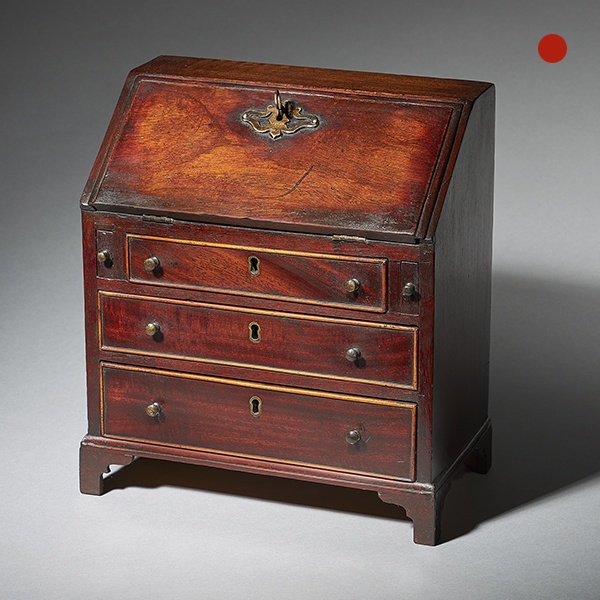
18th Century George II Mahogany Miniature Bureau
18th Century George II Mahogany Miniature Bureau SOLD Follow Us18th Century George II Mahogany Miniature Bureau What came first.... the miniature or the full scale? This small scale model at just 9” wide dates from the very beginning of the...
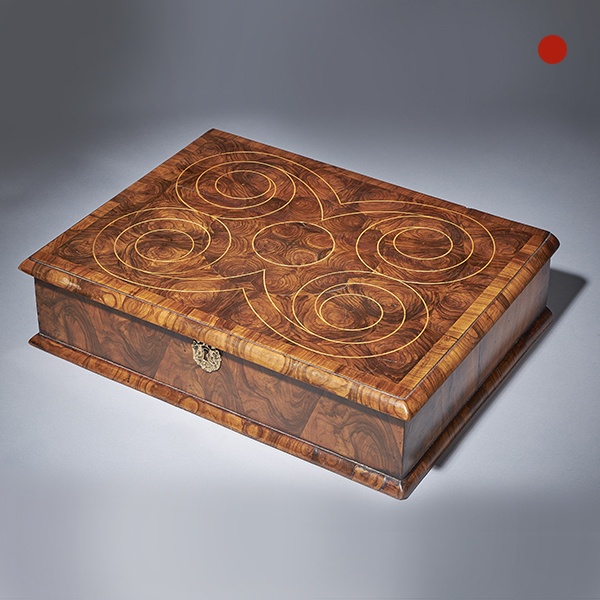
A superb 17th-century olive oyster lace box from the reign of King Charles II, circa 1675-85.
A superb 17th century olive oyster lace box from the reign of King Charles II, circa 1675-85. Geometric patterns adorn the selected and book-matched hand cut olive oysters to the top which is beautifully inlaid with fine boxwood stringing, cross-banded and edged with cross grain mouldings, all in figured olive.

An extremely rare George I walnut chest of small proportions on ball and bracket
An extremely rare George I walnut chest of small proportions on ball and bracket SOLD Follow UsAn extremely rare George I walnut chest of small proportions on ball and bracket The cross-grain moulded and feather banded book-matched top sits...

An extremely fine and rare early George III mahogany supper table plausibly by Thomas Chippendale
An extremely fine and rare early George III mahogany supper table plausibly by Thomas Chippendale Sold Follow UsAn extremely fine and rare early George III mahogany supper table plausibly by Thomas Chippendale An extremely fine and rare early...

Late 17th Century Charles II Carved Oak Bible Box, Deed Box, Blanket Box,or Candle Box
Late 17th Century Charles II Carved Oak Bible Bo, Deed, Blanket, or Candle Box Sold Follow UsLate 17th Century Charles II Carved Oak Bible, Deed, Blanket, or Candle Box A superb and original late 17th century oak box with excellent and deep...

Fine 18th Century Queen Anne Burr and Highly Figured Walnut Card Table
Fine 18th Century Queen Anne Burr and Highly Figured Walnut Card Table SoldFollow UsFine 18th Century Queen Anne Burr and Highly Figured Walnut Card Table A fine and rare Queen Anne burr and highly figured walnut card table, circa 1710...

18th Century George II Mahogany Miniature Bureau
18th Century George II Mahogany Miniature Bureau SOLD Follow Us18th Century George II Mahogany Miniature Bureau What came first.... the miniature or the full scale? This small scale model at just 9” wide dates from the very beginning of the...

A superb 17th-century olive oyster lace box from the reign of King Charles II, circa 1675-85.
A superb 17th century olive oyster lace box from the reign of King Charles II, circa 1675-85. Geometric patterns adorn the selected and book-matched hand cut olive oysters to the top which is beautifully inlaid with fine boxwood stringing, cross-banded and edged with cross grain mouldings, all in figured olive.
YOU MAY ALSO LIKE
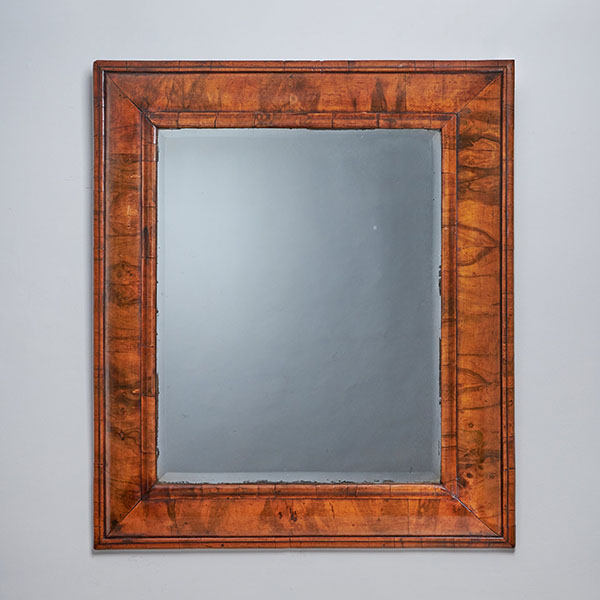
Large William and Mary 17th Century Figured Walnut Cushion Mirror c, 1690
Large William and Mary 17th Century Figured Walnut Cushion Mirror c, 1690 £7,495[wpforms_selector form_id="11387" show_title="on" _builder_version="4.22.1" _module_preset="default" custom_margin="-30px||||false|false" global_colors_info="{}"...
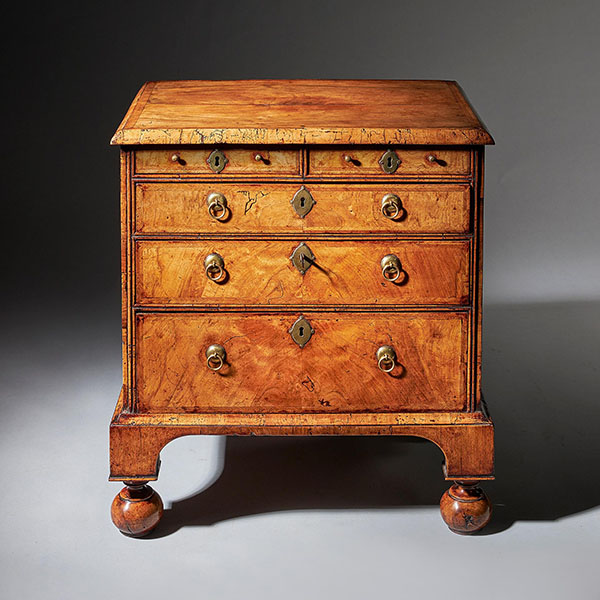
An extremely rare George I walnut chest of small proportions on ball and bracket
An extremely rare George I walnut chest of small proportions on ball and bracket £18,800[wpforms_selector form_id="11387" show_title="on" _builder_version="4.22.1" _module_preset="default" custom_margin="-30px||||false|false"...
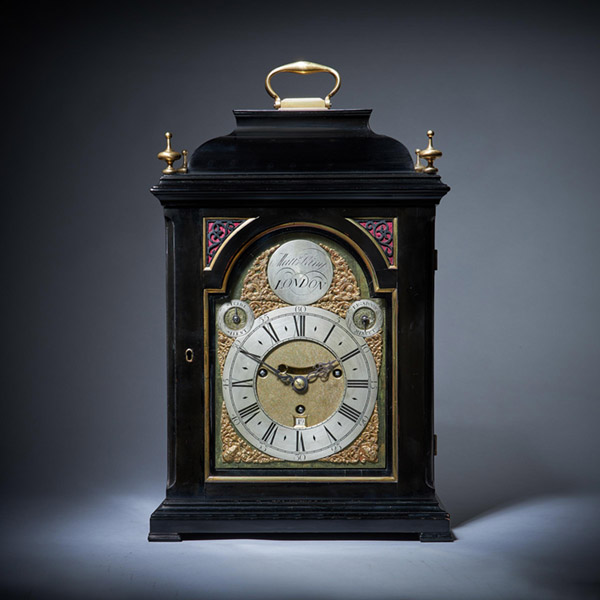
A Rare 18th Century George II Musical Table Clock by Matthew King, c. 1735.
A Rare 18th Century George II Musical Table Clock by Matthew King, c. 1735. £24,500[wpforms_selector form_id="11387" show_title="on" _builder_version="4.22.1" _module_preset="default" custom_margin="-30px||||false|false"...
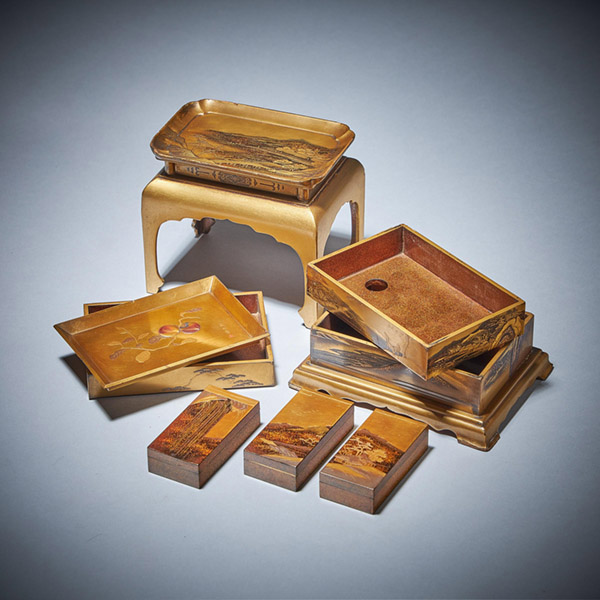
Signed Mid 19th C. Edo/Meiji Period Diminutive Lacquer Stacking Cabinet, Japan
Signed Mid 19th C. Edo/Meiji Period Diminutive Lacquer Stacking Cabinet, Japan £5,800[wpforms_selector form_id="11387" show_title="on" _builder_version="4.22.1" _module_preset="default" custom_margin="-30px||||false|false"...
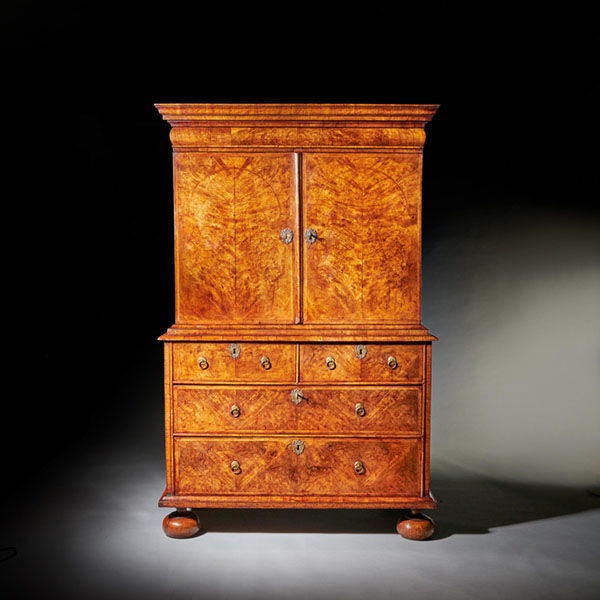
A Fine 17th Century William and Mary Burl Walnut Cabinet on Chest, Circa 1690
A Fine 17th Century William and Mary Burl Walnut Cabinet on Chest, Circa 1690 £27,800[wpforms_selector form_id="11387" show_title="on" _builder_version="4.22.1" _module_preset="default" custom_margin="-30px||||false|false"...
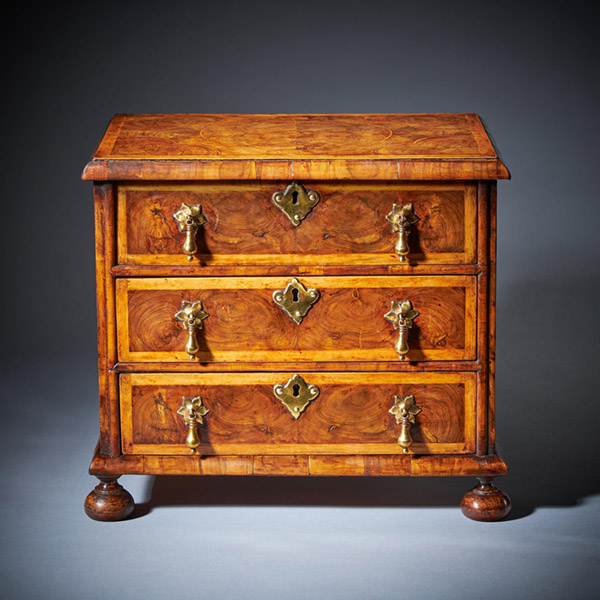
Miniature William and Mary 17th Century Diminutive Olive Oyster Chest C.1690
Miniature William and Mary 17th Century Diminutive Olive Oyster Chest, C.1690 £15,900Follow UsMiniature William and Mary 17th Century Diminutive Olive Oyster Chest, C.1690 A Fine Miniature William and Mary 17th Century Diminutive Olive Oyster...

Large William and Mary 17th Century Figured Walnut Cushion Mirror c, 1690
Large William and Mary 17th Century Figured Walnut Cushion Mirror c, 1690 £7,495[wpforms_selector form_id="11387" show_title="on" _builder_version="4.22.1" _module_preset="default" custom_margin="-30px||||false|false" global_colors_info="{}"...

An extremely rare George I walnut chest of small proportions on ball and bracket
An extremely rare George I walnut chest of small proportions on ball and bracket £18,800[wpforms_selector form_id="11387" show_title="on" _builder_version="4.22.1" _module_preset="default" custom_margin="-30px||||false|false"...

A Rare 18th Century George II Musical Table Clock by Matthew King, c. 1735.
A Rare 18th Century George II Musical Table Clock by Matthew King, c. 1735. £24,500[wpforms_selector form_id="11387" show_title="on" _builder_version="4.22.1" _module_preset="default" custom_margin="-30px||||false|false"...

Signed Mid 19th C. Edo/Meiji Period Diminutive Lacquer Stacking Cabinet, Japan
Signed Mid 19th C. Edo/Meiji Period Diminutive Lacquer Stacking Cabinet, Japan £5,800[wpforms_selector form_id="11387" show_title="on" _builder_version="4.22.1" _module_preset="default" custom_margin="-30px||||false|false"...

A Fine 17th Century William and Mary Burl Walnut Cabinet on Chest, Circa 1690
A Fine 17th Century William and Mary Burl Walnut Cabinet on Chest, Circa 1690 £27,800[wpforms_selector form_id="11387" show_title="on" _builder_version="4.22.1" _module_preset="default" custom_margin="-30px||||false|false"...

Miniature William and Mary 17th Century Diminutive Olive Oyster Chest C.1690
Miniature William and Mary 17th Century Diminutive Olive Oyster Chest, C.1690 £15,900Follow UsMiniature William and Mary 17th Century Diminutive Olive Oyster Chest, C.1690 A Fine Miniature William and Mary 17th Century Diminutive Olive Oyster...
